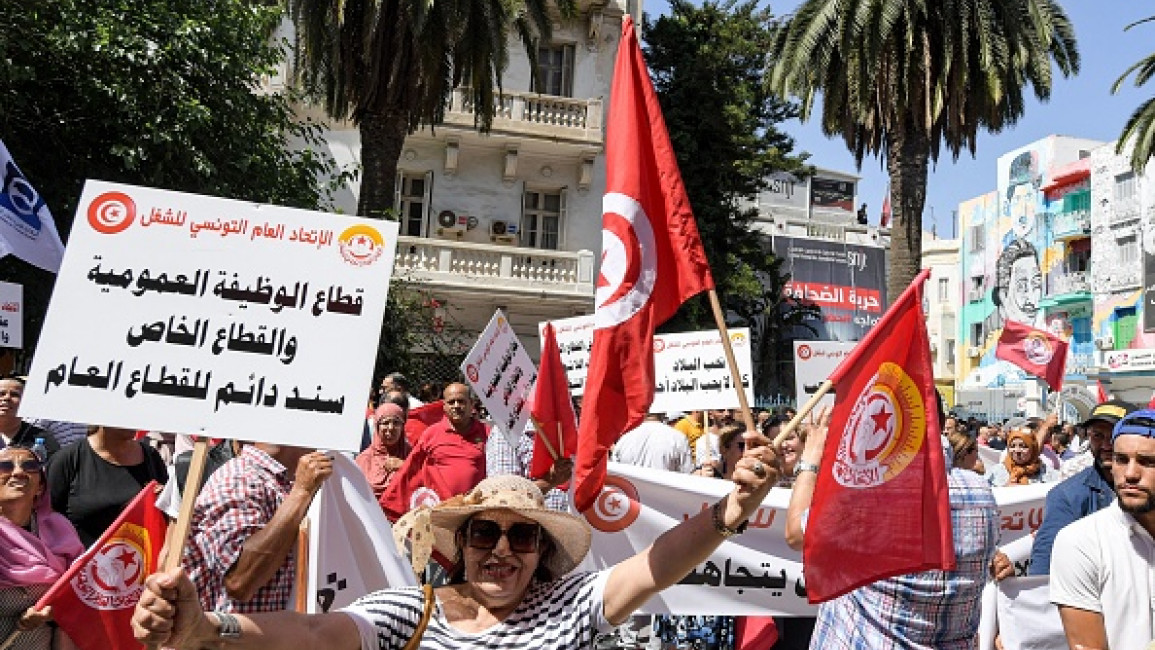Tunisia comes to a standstill in nationwide strike as unions confront Saied
Government and transports services, including flights, came to a standstill in Tunisia on Thursday amid a nationwide strike by the country’s main trade union confederation which piled pressure on President Kais Saeid, who is already facing a string of crises.
The powerful UGTT union called on up to three million public sector workers to strike on Wednesday, halting work at 159 state agencies and public companies to demand concessions on salaries and threatened reforms.
The action appeared to be widely observed in the capital Tunis, where post offices and public utilities were closed.
The strike officially commenced at midnight on Thursday (23:00 GMT).
In a statement, the UGTT said it is conducting the strike to "defend economic and social rights", after the government failed to respond to trade union demands.
إضراب واسع بدأ في #تونس صباح اليوم، بلغت نسبته 96.22 % بحسب الاتحاد التونسي للشغل 👇 pic.twitter.com/eBj5aSsyD9
— التلفزيون العربي (@AlarabyTV) June 16, 2022
On Thursday morning, dozens of workers gathered in front of the union's headquarters in Tunis, where the organisation's Secretary General, Noureddine Taboubi, delivered a speech.
"If the government was serious, it would have looked for solutions to our demands," he said.
Despite the strike, certain facilities such as electricity and gas companies, water distribution and hospitals, will maintain a minimum level of public and emergency services.
"The general strike is going well and according to the arrangements announced by the trade union central," the UGTT’s assistant secretary-general, Monem Amira El-Khamis, told The New Arab’s Arabic-language service.
Police were present in large numbers outside UGTT headquarters as strikers began to gather for a rally.
Additionally, public television played repeats and carried an announcement that staff were taking part in the strike.
The suspension of public transport forced people to use alternative modes of transport in order to get to work, either in the private sector or in government departments which were unaffected by the strike.
At the capital's main airport, check-in desks were empty and frustrated passengers gazed at screens showing rows of cancelled flights.
شلل تام في مطار تونس قرطاج بعد إلغاء جميع الرحلات البرمجة اليوم الخميس تنفيذا الإضراب العام#تونس #إضراب pic.twitter.com/y8Jq6Q8yb4
— Tunigate - بوابة تونس (@Tunigate) June 16, 2022
Tunisian economist Fadhel Kaboub told AFP that "the strike is the culmination of a collective failure by more than 10 Tunisian governments, the UGTT, the International Monetary Fund and Tunisia's international partners to restructure the economy".
"It will serve as a reminder to the IMF that working people in Tunisia can only sustain so much economic pain," he added.
'Painful reforms'
The strike comes as Tunisia prepares to enter formal talks with the IMF on a new bailout plan for its debt-laden economy.
Tunisians are facing soaring inflation and the UGTT has demanded a new deal to raise public sector salaries, including retroactively for last year.
While the UGTT's opponents say it is ignoring the country's deep financial woes, its leverage has been boosted by the IMF making a bailout deal conditional on trade union support.
The government has presented a reform plan to the global lender which includes a freeze on the public sector wage bill, progressive cuts to some subsidies and a restructuring of publicly owned companies.
But the UGTT, which has warned against "painful reforms" aimed at pleasing the IMF, has demanded guarantees that state sector firms, including some monopolies, will remain publicly owned.
Employment Minister Nasreddine Nsibi said the government reserved the right to requisition some workers to allow essential services to operate.
While the UGTT insists the strike is not political, it comes as President Saied faces intense criticism for excluding opposition forces from his "national dialogue" - part of a push to overhaul the Tunisian state and consolidate an ongoing power grab.
The president sacked the government and suspended an elected parliament in July last year, before dissolving the legislature in March and sacking scores of judges by decree earlier this month.
The union was invited to take part in the national dialogue, but refused on the grounds that key political forces were not. It also argued that the process aimed to push through "conclusions decided unilaterally in advance".
The UGTT, a co-laureate of the Nobel Peace Prize for its efforts in a previous national dialogue in the wake of Tunisia's 2011 revolution, had originally backed Saied when he sacked the government and suspended parliament.
But it has become increasingly critical as Saied has extended his power grab, which some of his rivals describe as a coup in the only democracy to emerge from the Arab uprisings of 2011.


![Minnesota Tim Walz is working to court Muslim voters. [Getty]](/sites/default/files/styles/image_684x385/public/2169747529.jpeg?h=a5f2f23a&itok=b63Wif2V)




![Debris near Rafic Hariri International Airport [Getty]](/sites/default/files/styles/image_330x185/public/2176162423.jpeg?h=a5f2f23a&itok=MCSK9mkM)
![An Israeli air strike on Jabalia killed teenage journalist Hassan Hamad [Screengrab/X]](/sites/default/files/styles/image_212x120/public/2024-10/hassan%20hamad1.jpg?h=c12e0b96&itok=KstD_5xk)
